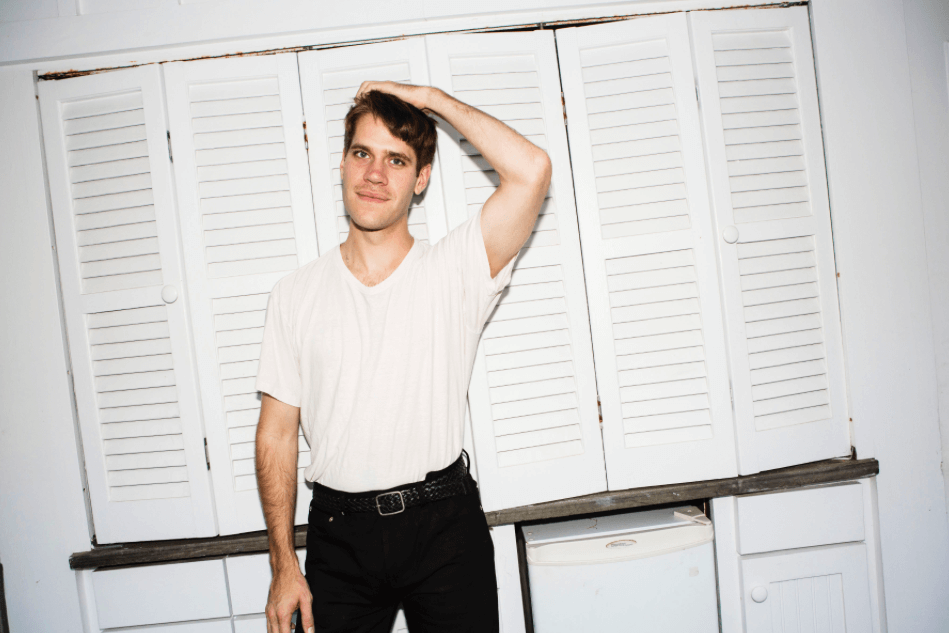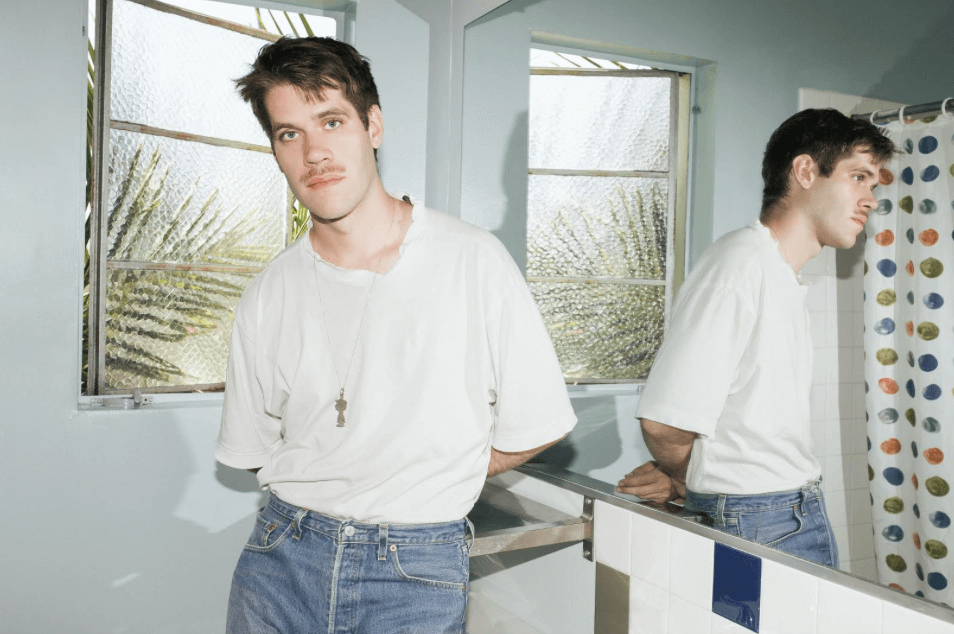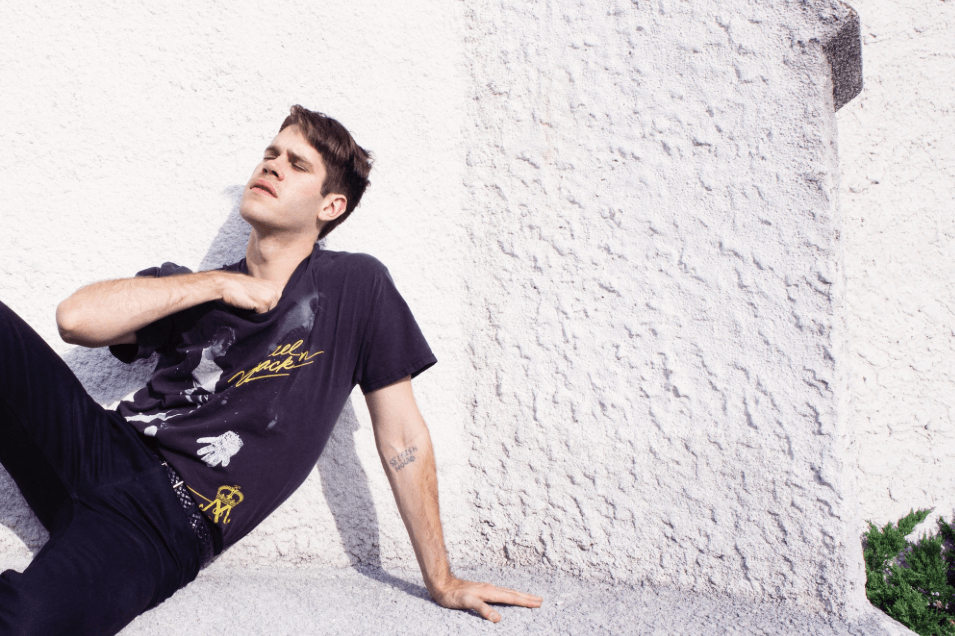Talking with Aaron Maine of Porches about Life, Love, and His New Sound

Aaron Maine, of Porches.
Fans of Porches, the band begun in 2010 by musician Aaron Maine, might be surprised by Pool, his second LP released earlier this month. Compared to his prior LP, Slow Dance in the Cosmos, Pool’s ten tracks are synth-driven, calm, and sweet. The mood belongs to a person who is reflective, in love, and happy—all of which Maine is.
He moved to New York City three-and-a-half years ago for his then-budding, and now long-standing relationship with Greta Kline of Frankie Cosmos. As that relationship took shape, so did Slow Dance in the Cosmos, and that’s what the album sounds like. The voice in that album belongs to a man whose world is being up-rooted, and who is feeling all sorts of things, very intensely about it. “I would rip into it and yell if it felt appropriate,” Maine tells me yesterday about his earlier singing, inside Think Coffee on Mercer Street, next to the apartment he now shares with Kline.
Inside, two things surprise me immediately. One, Maine’s hair: It was bleached white-yellow blonde, so I didn’t recognize him. In all of his pictures, his hair is brown. Second, his voice: Pool’’s tracks at times rises to tenor range, but when Maine talks it’s pure bass. Deep and gravely. “I was experimenting with vocal stuff on that album,” he says of Pool. “I was trying to make it a little sweeter, and sensitive.” Maine recorded himself inside his and Kline’s apartment. “I wanted it to be really intimate, and late-night romantic vibes,” he says, and he succeeded. Pool gives you the feeling of a couple in their apartment, and music made there that, even when not strictly about it, is driven by love.
We sat on a big couch in the back room of Think, which at 10am was already chock full of computer heads, typing away. Maine had just rolled out of bed and sat sipping a giant coffee and eating a muffin while he talked to me about Porches’ upcoming, one-and-a-half-month tour. He’ll leave for that on March 8, and it will take him and his band around the US and Europe. He’s excited, but also feels somewhat overwhelmed.
“You’re doing what you love four percent of the time, and the rest of the time you’re literally in a car, on Instagram,” he tells me, painting a straightforward picture of tour life. “So it’s super fun but I always dread it leading up to it.” He thinks for a second. “It should be said or known that it’s a lot to keep up with your music and tour as much as you’re supposed to. I’m just realizing this now—that’s why I’m like,” he makes a face, “It just gets crazier.”


But will Greta, at least, be with him?
“No, that’s the other thing!” he says, in a way that means he will be ok but also, genuinely, laments this fact. “Her album is coming out, and I leave a month before and she leaves and and it’s like three to four months, which sucks,” he says. “It should be fine, but it did dawn on me—that’s like a quarter of a year!”
Maine, now 27, grew up in the small Westchester town of Pleasantville with a songwriter dad and a pianist-dancer mom. He also had a lot of friends he skateboarded with and who, like him, were very into the Strokes, a band he credits for providing the sound track of his youth (not a title he gave them, but what he answered when I asked).
“First of all, the songs are like insanely catchy,” he said of their music, when I asked what the Strokes did for him. “But,” he continued, “they’re dressed up as grungy garage songs and, I don’t know, it’s just a perfect storm. They all seem impossibly cool, and have like a don’t-give-a-fuck attitude. It’s so strong.”
Maine first started writing songs when he was 17. He’d take an instruction manual and read it over chords so he had something to say. But he got the hang of it soon enough. “I always feel like I was lucky to have started when I was younger, and wasn’t so self-conscious about [lyric writing].” Lyric writing when older can be difficult, he says, because you’re too aware of meaning and implications. “I was younger, and went for it, and there were no consequences because it was just my friends who heard it.”
His very first album, called Harmonica, arose from another relationship. “I was dating my first love at the time and, cliche as it sounded, it was a source of inspiration. That album is a total flash back to that time. Sometimes I put it on and reflect.”
Maine played the trumpet from 4th to 12th grade and, for a moment, thought he might study it in college. Instead, he went for painting at SUNY Purchase. But the art world wasn’t for him. Music, however, was never a question. It was simply what he did. Except his plan was never to move to New York. His friends lived and played music in Philly, and that seemed pretty appealing to him—only, before he left for Pennsylvania, he met Greta. A course adjustment was made. They had only been together six months when they moved into their New York City apartment.
“It, like, worked out. And I feel like that seems crazy but, I thought, it’s either going to work or it’s not, and you have to put yourself in that situation to find out,” he said, meaning, into the relationship. “It might run its course earlier, I guess, if it doesn’t work. It’s a crazy decision but…” For a second he reflected on how it was kind of strange that he had never lived here as a single person, and how he might have missed out on having his own place. But he wan’t wistful about it, just stating what was.
And in the meantime, Maine has grown to really love New York, despite the fact that he never envisioned himself here. To the extent that he has dug deep creatively and focused and worked extremely hard, he does not think Philly, with cheaper rent and coffee shop jobs you can support yourself on, would have prompted the same kind of output.
“So, yeah, the history of me in New York is just about as long as dating each other,” he says of Greta. “I’m so happy I did. I’m like, obsessed with it,” he says of the city. “It’s weird to think how different it would be [in Philly].”


I noted that on Pool, while all the songs sound minimal and low key, each one achieves that distinctively, yet they all still sound like they belong on the same album.
“With this album, I wanted to achieve a certain mood, and like a cohesiveness,” says Maine. “That was a step for me. There was enough of a concept to go with and help guide me through the process.” Previously, he said songs would pile up and he’d group them together and call it an EP or an album. “This time I really thought about it,” he said.
I say that must have felt good, that it must be professionally exciting. “Yeah, it’s really fun. It felt like I… I felt that I was growing. You know what I mean?” I did. “Yeah, it just feels fresh to me. Like a new chapter or something. I think that’s how it should feel,” he says. I laugh, imagining how much of a bummer it would be to make an album that felt like five years old. He laughs, and adds to the joke, “Yeah, like, here’s another one,” he says laughing.
We’d gulped through our coffees, and he has to leave to do another interview, the next one over the phone, in 30 minutes. He wraps a beige scarf around his blonde head in preparation for outside, and then he tells me, unprompted, that he quit smoking cold turkey four days earlier. A pack a day is what he used to tear through for many, many years.
We walk outside; he was headed to Washington Square Park before his “phone in,” two words he recites in a perfect Australian accent (most of his label stuff happens there, explains). Saying them, he slips into a character that might be described as a relaxed goof ball. He asks me if I’m going back to my office, and where that is, and at our point of departure I got ready for our thanks-very-much handshake. But without hesitation, Maine went straight in for the hug.
See Porches at the end of their 2016 Pool Tour at the Music Hall of Williamsburg on April 13, and The Bowery Ballroom on April 15.
You might also like 



















